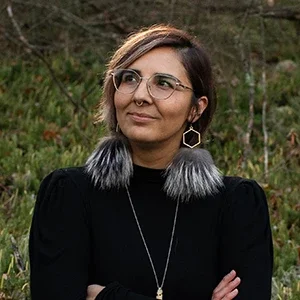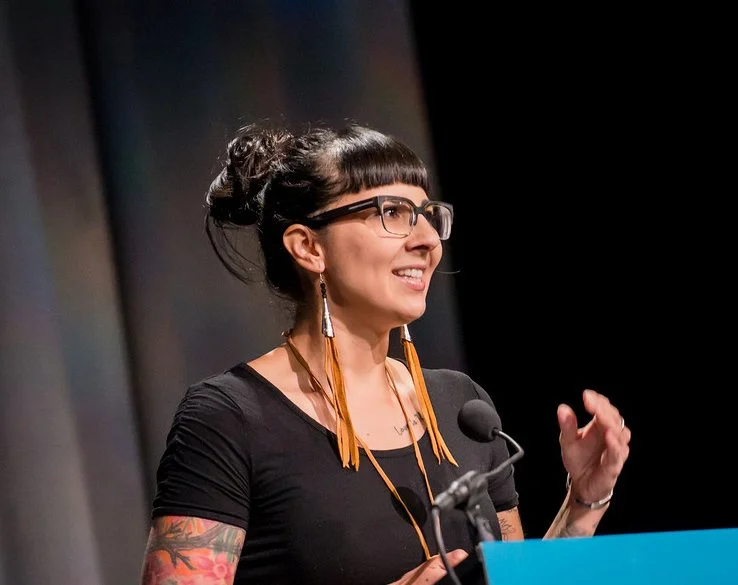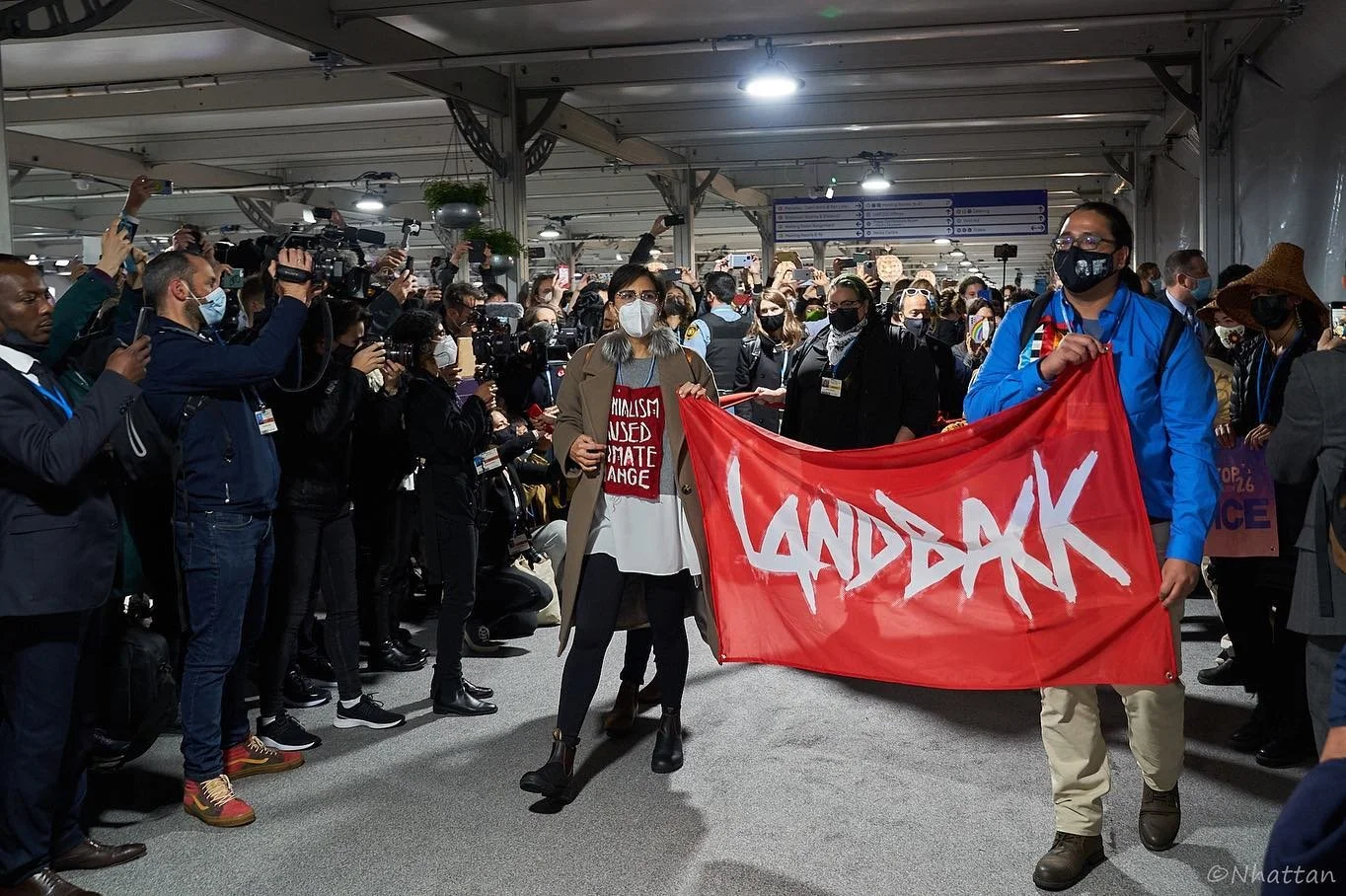Eriel Deranger
…is leading Indigenous Climate Action to expand its Climate Leadership trainings and support powerful work in frontline communities.
A healthy climate movement requires a diversity of tactics and strategies, and Eriel Deranger is clear on hers: Indigenous Climate Action (ICA) is dedicated to bringing more Indigenous people into the climate movement with leadership training through an unapologetically decolonial lens.
Over the past ten years, ICA has grown from a startup nonprofit, to a staff of 25 who have trained over 250 Indigenous climate leaders; supported frontline projects that meld climate solutions with Indigenous sovereignty; led new research on the intersection of Indigenous cultural practices and GhG reductions; and expanded ICA’s work to include trainings on divestment, greenwashing and “redwashing” (using Indigenous peoples as the face of climate solutions that don’t benefit them), and international climate policy through an Indigenous rights-based lens. “We now have about 15,000 people on our email list, do outreach on social media, and through direct relationships with tribal councils, treaty offices, and First Nations.” says Eriel. “When we first launched our training programs, we struggled to get 12 people to sign up. Now we launch a call for a cohort for the climate leadership program, and it’s full within three days.”
Last year, Eriel’s leadership was recognized with the prestigious Climate Breakthrough Award, one of four recipients worldwide for the 2024 cohort. She’s using the support to develop a globally coordinated effort for Indigenous peoples to bring effective and well-resourced climate solutions into national and international climate frameworks – and ensure they’re appropriately valued in negotiations.
“All of the work around transitioning Indigenous communities to clean energy is necessary, but it doesn't address the justice elements, or take a systems change approach. That work comes through a decolonial model, and that's where ICA has really found our niche.”
“We have a Venn diagram, and it has Strategic Disruption in one circle and Nurturing Capacities in another – and in the center of the diagram is the Creation of the New. If we put equal emphasis and value on strategic disruption and nurturing the capacities of our communities, what happens is that we create this space for creating something completely different.”
ICA’s niche & approach:
“One of my original theories of change for building ICA is trying to uphold the bare minimum standards of the United Nations Declaration on the Rights of Indigenous Peoples, which is Free, Prior and Informed Consent (FPIC). When we talk about FPIC, people constantly think about consent – but it's actually free, prior information to determine consent. Consent doesn't come from saying, do you want to be a part of my campaign, yes or no? It comes from giving people free, prior information in a timeline that lets them digest it and determine where they want to go. And that is the model that I have been trying to apply in all of the delivery of programs at ICA.”
Eriel’s introduction to environmentalism:
“I didn't come into environmentalism the way a lot of people in middle class settler society did, getting to go: ‘Oh, wow, there's a problem, I want to help change that.’ In my community, I was inside the problem. I was getting calls from my family saying: ‘We're dying, they're killing us, our animals are dying. Look at the fish I caught; look at the moose I caught; look at the caribou we caught. And just me being like: what do I do?”
On the strategy that’s missing in organizing now:
“There is a retraction happening in the climate movement right now. Very few organizations are holding action camps to train people to understand the political theory behind why we engage in non-violent direct action and civil disobedience. ENGOs stopped prioritizing skilling up folks, and instead invested really heavily on the flash in the pan: everyone, let's go get arrested at the White House, or at this office. We’ve created this assumption that everyone understands the political theory. But we have a whole new generation of young people that are angry and disenchanted with systems and societies and capitalism that think that the strategy – like, the full strategy – is disruption, when it's not. The full strategy is based on understanding political theory and how transformative change happens.”
“Nonviolent Direct Action (NVDA) has been a key catalyst for change, both at the policy level and at the legislative level. We saw this in the civil rights movement, and we've seen this within the climate movement itself: disruption and civil disobedience are the catalyst for the change that is necessary to address the climate crisis. ICA really wants to build a whole track just on NVDA and the role it plays in transformative change.”
On how upholding Indigenous rights strengthens the global climate movement:
Say we build a massive conservation effort for caribou and the management of our fish and our river systems – which we are actually in the process of doing. And we've also built this massive solar farm, and we're trying to get off of diesel. Canada is going to look at the reduction of emissions and the safeguarding of biodiversity and include it in their Nationally Determined Contributions [for global climate action under the Paris Agreement]. And our communities are not trained to understand the value of carbon sequestration as a way to advance our sovereignty and self-determination in government negotiations. Because the government didn't come up with those strategies for caribou and fish management and biodiversity management – our communities did! And yet we are constantly looked at in the public as a drain: “Why are we putting so much money in Indigenous communities?” Well, we're doing it because Indigenous communities have safeguarded 80% of the world's biodiversity!
In the framework of Canada, biodiversity management has been hugely led – particularly in Canada's northern Boreal forest – by Indigenous peoples. And yet Canada co-opts that and says that they're the ones doing this emissions reduction work.
In my Climate Breakthrough campaign work I'm trying to figure out, how do we create better mechanisms to understand Indigenous rights on a global level, as part and parcel to actual emissions reductions through things like sovereignty, self-determination, and land back?
I'll give you an example from my community…
And so for myself, it's like: how do we move that line of understanding in Indigenous communities to be like, wait a second – our culture, our land use, our knowledge systems are not just important for us, but the government needs them in order to meet their commitments to the Paris Accord? There's huge amounts of money and energy being put into these Indigenous conservation efforts: is this work being properly valued? Are communities in a place to negotiate the proper value of what they're actually doing with this work?
If we start to contextualize how Indigenous peoples and the ways in which they're trying to advance their rights is not an impediment to progress, but is actually necessary for us to meet our climate commitments as a whole — we start to value Indigenous rights movements as necessary, as opposed to a challenge for settler society.




